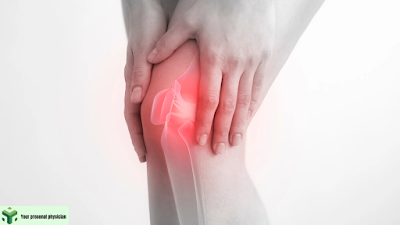Understanding Rheumatoid Arthritis: Causes, Symptoms, and Treatment
Introduction:
 |
| Understanding Rheumatoid Arthritis: Causes, Symptoms, and Treatment |
Rheumatoid Arthritis (RA) is a chronic autoimmune disorder that primarily affects the joints, causing inflammation, pain, and stiffness. It can also involve other organs and systems of the body. RA is a systemic disease, meaning it can affect multiple parts of the body simultaneously. This article aims to provide a comprehensive overview of RA, including its causes, symptoms, diagnosis, and treatment options.
Causes of Rheumatoid Arthritis:
RA occurs when the immune system mistakenly attacks the body's own tissues, primarily the synovium—the membrane that lines the joints. The exact cause of this autoimmune response is still unknown, but a combination of genetic, environmental, and hormonal factors is believed to play a role. Certain genes, such as HLA-DR4, are associated with an increased risk of developing RA. Environmental factors such as smoking, infection, and exposure to pollutants may trigger the disease in genetically susceptible individuals.
Symptoms of Rheumatoid Arthritis:
 |
| Understanding Rheumatoid Arthritis: Causes, Symptoms, and Treatment |
The symptoms of RA can vary from person to person and may come and go. Common symptoms include:
1. Joint pain, swelling, and stiffness, typically affecting multiple joints symmetrically.
2. Fatigue and weakness.
3. Morning stiffness lasting for more than an hour.
4. Loss of appetite and weight loss.
5. Rheumatoid nodules—firm bumps under the skin, often over bony areas.
6. Inflammation of other organs, such as the eyes, lungs, and heart.
Diagnosis of Rheumatoid Arthritis:

Understanding Rheumatoid Arthritis: Causes, Symptoms, and Treatment
Diagnosing RA can be challenging, as there is no single test to confirm the disease. Healthcare providers typically rely on a combination of medical history, physical examination, blood tests, and imaging studies. Blood tests may reveal elevated levels of certain markers, such as rheumatoid factor (RF) and anti-cyclic citrullinated peptide (anti-CCP) antibodies. Imaging tests such as X-rays, ultrasound, and magnetic resonance imaging (MRI) may be used to assess joint damage and inflammation.
Treatment of Rheumatoid Arthritis:
The goal of RA treatment is to relieve symptoms, reduce inflammation, prevent joint damage, and improve overall quality of life. Treatment strategies may include:
1. Medications: Nonsteroidal anti-inflammatory drugs (NSAIDs), corticosteroids, disease-modifying antirheumatic drugs (DMARDs), and biologic agents are commonly used to manage RA symptoms and slow disease progression.
2. Physical therapy: Exercise programs, stretching, and strengthening exercises can help improve joint function and mobility.
3. Lifestyle modifications: Maintaining a healthy weight, quitting smoking, and avoiding excessive stress on the joints can help manage RA symptoms.
4. Surgery: In severe cases of RA where joint damage is extensive, surgery such as joint replacement may be necessary to restore function and reduce pain.
Conclusion:
 |
| Understanding Rheumatoid Arthritis: Causes, Symptoms, and Treatment |
Rheumatoid Arthritis is a complex autoimmune disorder that can significantly impact an individual's quality of life. Early diagnosis and appropriate treatment are essential for effectively managing the disease and preventing long-term complications. With ongoing research and advancements in treatment options, there is hope for better outcomes for individuals living with RA.
Frequently Asked Questions (FAQs)
1. What is Rheumatoid Arthritis (RA)?
- RA, its an autoimmune disorder affecting the joints.
2. What are the Symptoms of Rheumatoid Arthritis?
- This question delves into the common signs and symptoms associated with RA, such as joint pain, stiffness, swelling, and fatigue.
3. What Causes Rheumatoid Arthritis?
- Here, the focus is on exploring the underlying causes of RA, including genetic predisposition, environmental factors, and immune system dysfunction.
4. How is Rheumatoid Arthritis Diagnosed?
- This question aims to explain the diagnostic process for RA, including physical examination, blood tests, imaging studies, and evaluation of symptoms.
5. What are the Available Treatment Options for Rheumatoid Arthritis?
- This question provides an overview of the various treatment modalities for RA, including medications (such as DMARDs, NSAIDs, and biologics), physical therapy, lifestyle changes, and surgical interventions.
6. Can Rheumatoid Arthritis be Cured?
- Here, the focus is on discussing the management and control of RA rather than a cure, emphasizing the importance of early diagnosis and ongoing treatment to manage symptoms and prevent joint damage.
7. How Does Rheumatoid Arthritis Differ from Other Types of Arthritis?
- This question aims to differentiate RA from other forms of arthritis, such as osteoarthritis, highlighting the autoimmune nature and systemic involvement of RA.
8. What Complications Can Arise from Rheumatoid Arthritis?
- Complications associated with RA, including joint deformities, organ involvement (such as the heart and lungs), and increased risk of cardiovascular disease.
9. What Lifestyle Changes Can Help Manage Rheumatoid Arthritis?
- Here, the focus is on discussing lifestyle modifications that can complement medical treatment, including exercise, diet, stress management, and smoking cessation.
10. What Research and Developments are Ongoing in the Field of Rheumatoid Arthritis?
- Improving the understanding, diagnosis, and treatment of RA, including advancements in biologic therapies, personalized medicine, and novel treatment targets.